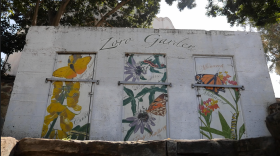Most people who attend tonight’s public meeting in Dana Point expect to discuss the latest news about the future of the San Onofre nuclear power plant. Southern California Edison released its restart plan last week. The Chief Nuclear Officer, Peter Dietrich, described the company’s plan to keep Reactor Unit 3 offline indefinitely, but restart Unit 2.
“Here’s why it will be safe to restart Unit 2 at reduced power,” Deitrich said, “detailed vibration analysis have been completed by several independent experts. These experts have concluded that operating Unit 2 at 70 percent power will eliminate the thermal hydraulic conditions that caused the tube-to-tube wear in Unit 3.”
Dietrich said Edison proposes to shut the Unit 2 reactor down again within five months to inspect the steam generator tubes. These tubes are the weak link in the nuclear generation process, because one of the tubes in Unit 3 ruptured last January, releasing a tiny amount of radiation.
Edison’s explanation of why it is safe to start Unit 2 though not Unit 3 has raised questions. Groups like Friends of the Earth say the tubes in both units are in far worse shape than at any other plant in the country.
But Lara Uselding of the Nuclear Regulatory Commission said it’s too soon for ask the NRC to respond to the restart plan.
“It just so happens that Southern California Edison was ready to submit their restart plans,” Uselding said. “We are obviously not going to be ready to respond to in-depth questions about that, because it’s going to take several months to review the several hundred pages of documents that have come in.”
Uselding said the purpose of the meeting is to share the latest on the NRC’s investigation of San Onofre’s problems and hear public concerns.
A panel of people has been invited for a roundtable discussion. One of them is Don Mosier, a Del Mar city councilman.
“I’m going up there," Mosier said, "to say that Del Mar and eight other impacted communities close to the San Onofre nuclear generating station all oppose the restart of Unit 2 without a full evidentiary hearing.”
The demand for a “full evidentiary hearing” comes from people who think the NRC may have approved Edison’s new steam generators without enough oversight.
Daniel Hirsch of the group Committee to Bridge the Gap said his group and the environmental group Friends of the Earth have demanded hearings with independent experts for months. He said the operator, Edison, should not be allowed to restart the reactors without a license amendment, and that would require an independent hearing.
Hirsch called tonight’s meeting a poor substitute.
“It is essentially a public relations exercise,” he said, “to claim there was some effort to have a public meeting and to make sure that you never have a real testing of the technical claims Edison has made.”
The regulatory agency has in the past denied petitions from Friends of the Earth for independent hearings. NRC Regional Administrator Elmo Collins said yesterday that the license amendment is " an open question."
"I'm not saying yes or no," he said.
Rochelle Becker of the Alliance for Nuclear Responsibility will also be on the panel at tonight’s meeting. She said she will be there to listen.
“Most importantly,” Becker said, “to make sure that the Public Utilities Commission, who represent me as a rate payer, is listening and listening very carefully.”
This is the first time, Beck said, that the California Public Utilities Commission has attended a public meeting on the problems at San Onofre. She said this state agency, not the federal NRC, will ultimately decide if the problems at the nuclear plant are just too expensive to fix.
“It’s very important,” Becker said, “that the agencies that oversee nuclear, whether they be federal or state or the utility, all sit in the same room and listen to the same information.”
Tonight’s meeting may be a prelude to a new round of CPUC hearings expected to start later this month, that will consider if it is really cost-effective for the ratepayer to bring San Onofre back on line.







